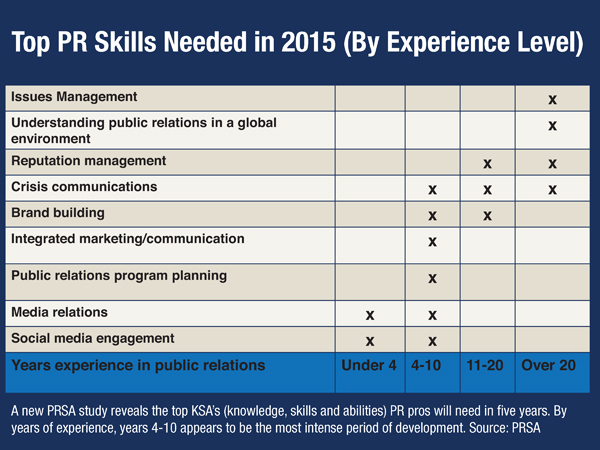Despite a slow rise in PR budgets in the last several months, there are still many communicators who’ve been hit hard by the economy, and are out there looking for prime PR jobs. But what is the jobs outlook, and what skills will be needed today and in the future for communicators to rise to the top?
 |
The jobs forecast for today, says Lisa Ryan, senior VP at Heyman Associates, a PR executive search firm, is good at the executive level. “While last year left much to be desired, 2010 has been a great year for hiring PR execs,” says Ryan. “We’re seeing increased demand for communications people.”
Alexis Gorman, senior associate at search firm Spencer Stuart, also sees more hiring of PR pros. “Part of that, I think, is that having been through an economic crisis, companies see the value of good communications,” says Gorman. “Cutting PR people really hurt them.”
Gorman and Ryan, along with Donald Wright, public relations professor at Boston University, were on hand at last week’s PRSA International Conference to present at the session, “Tomorrow’s Professional: Employer Demand for PR Knowledge, Skills and Abilities.” In that session, Wright revealed preliminary findings of a recent PRSA survey that polled more than 1,000 PR pros on what they thought the key communications skills that would be needed in 2015.
The top skills needed? Social media, crisis communications and reputation management, in that order. Writing, listening and problem solving were also high on the list for those looking to climb to the top of the PR ladder (see the chart below for some of the findings). The data were no surprise to Wright, though listening is overlooked. “Writing will continue to be key, but so is listening—and you never hear of awards being given out for ‘best listener,’” he says.
Ryan agrees that those skills identified in the survey were at the top of Heyman’s list, too, but she adds leadership skills to the mix. “Our clients say ‘bring me a leader,’ and the big question is how do you become that leader?” she says.
Gorman suggests not waiting before you have a team to manage to hone your leadership skills, and recommends these three steps:
• “Volunteer for projects where you can build cross-functional teams,” she says.
• Start thinking about having a world view in communications. “The top communications leaders have that view,” says Gorman.
• “Serve as a leader among peers, and be insightful in meetings,” she adds.
THE DEGREE FACTOR
Being insightful, says Ryan, includes knowing the business you are in inside and out. “Understand not only what your company is doing, but what your competition is doing,” she says. Gorman takes the business component a step further. Not only should you know your business, but business in general. “You must be able to weigh in on business strategies,” she says.
Which begs the question, if you aspire to a top communications position, do you acquire an MBA? Wright says time and geography are big factors in that decision. “It can take three or four years to get one, and you may not live in a part of the country where there is a solid MBA program available,” he says. Wright does add that there are interesting online MBA programs affiliated with some prominent schools.
Wright cites the career path of Jon Iwata, senior VP of marketing and communications at IBM, as an example of what can be accomplished as an undergraduate. “Iwata went to San Jose State as a journalism major, and changed to the PR track,” says Wright. “Now he is one of the world’s most successful communicators.”
Ryan says having an advanced degree in strategic communications might be the way to go, because communicators can be in a program at night and work during the day. “It’s great to have a master’s, but it’s what you do with it afterwards that counts,” she says. Gorman puts another spin on degrees: “If you work as a communicator in the academic world, where everyone has umpteen degrees, it’s probably a good idea to have an advanced degree yourself.”
APR CERTIFICATION
With the subject of credentials looming large, the role of APR can’t be ignored. But both Ryan and Gorman, PR search professionals with years of combined experience, say the APR moniker doesn’t mean much to potential employers. “In the 21 years I’ve been in this business, a client has never asked me if a candidate was APR certified,” says Ryan. “Truthfully, it doesn’t mean anything to the majority of employers.”
ENTRY LEVEL LOW
So how does a person getting their communications degree best get into PR, particularly as the job market is still somewhat soft? Starting salaries can be “disgustingly low,” says Wright, particularly at big agencies owned by conglomerates. “A person may be bringing in $100,000 worth of billable business, yet make $30,000 a year,” he continues. “I’ve had parents point out to me that they’ve paid $200,000 for their son’s or daughter’s education, and they’re going to get a PR job at minimum wage?”
The bottom line, says Wright, is that academia does not produce a raw product that a PR practice can’t do without. “If we were lawyers, we wouldn’t be talking about this situation.”
Look for the full results of the PRSA survey in early 2011. PRN
CONTACT:
Donald Wright, [email protected]; Lisa Ryan, [email protected]; Alexis Gorman, [email protected].
